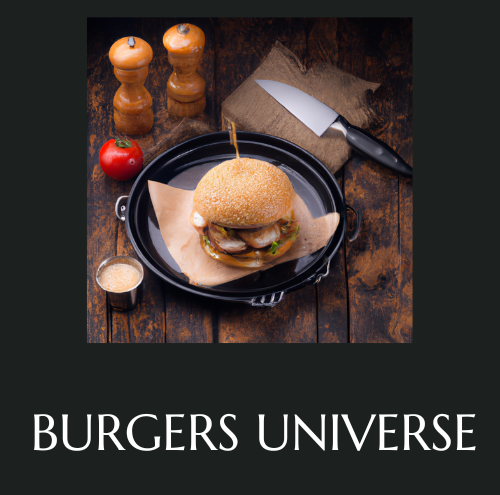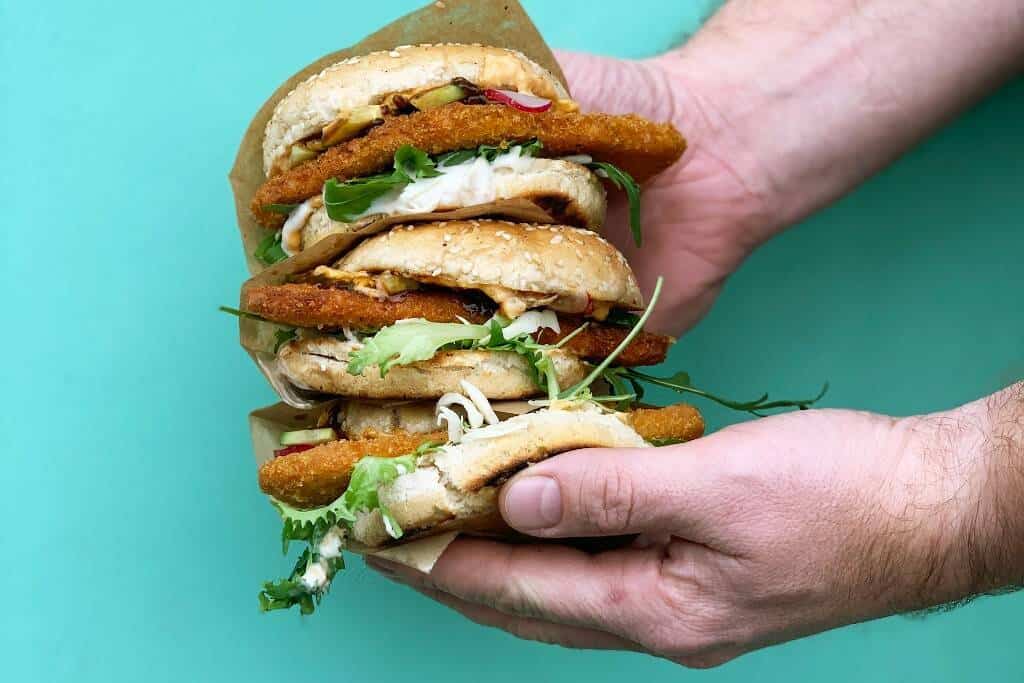Although the veggie patty options are limitless, the staples of veggie burgers are various kinds of beans, nuts, grains, tofu, mushrooms, and obviously (or maybe not that obvious), vegetables! Seasonings play a significant role as well, as they have the power to change the flavor of the veggie patty completely.
The ingredient list for veggie burgers is also ideal for vegans, which is why the veggie burger has been adopted and embraced by the vegan culture with open arms.
The Veggie Patty Foundation
The secret in creating a veggie burger is to use ingredients that will mix and bind together all other ingredients well and allow you to form the mixture into a patty easily. Most chefs and vegan advocates agree that chickpeas are a great binding agent that packs a nice, flavorful kick.
Cooked sweet potatoes, mixed pulses (also known as mixed beans), and black beans are all staple ingredients used as binding agents for what will be, your veggie mixture. Although eggs can be used as a binding agent, we don’t recommend it. Once you have chosen your preferred base, you can incorporate any of your favorite vegetables (minced and chopped), and seasonings to taste. The options are truly endless.
The Vegetables and Seasonings
Ah, vegetables, the predominant ingredient in veggie burgers. Making your homemade veggie patties is a great way to use leftover vegetables and bean leftovers. In this manner, you are also in control of the taste, and use all-natural ingredients, with zero preservatives. You will find that your vegetable mixture will taste different every time!
Some of the more commonly used vegetables are carrots, zucchini, potatoes, sweet potatoes, onions, parsley, black olives, bell peppers (red, green, or yellow), garlic, artichoke, mushrooms, cauliflower flour, avocado, yellow squash, spinach, corn, and broccoli.
Some of the more commonly used seasonings include paprika, chili powder, oregano, chili flakes, cumin, salt, pepper, sage, seasoned breadcrumbs, and garlic.
If you select your favorite binding agent, it is also okay to choose two if desired, and three to four of your favorite vegetables, and sprinkle your favorite seasonings, your veggie burger will truly be custom-tailored to taste! It is also a fun way to mix and match and experiment with which recipes you enjoy best.
You will also find that you can prepare a double batch each time and opt to freeze the other for later! A great meal prep idea for those on the go lifestyle.
Vegan Veggie Burger Tips
As far as vegan options while dining out, restaurants have wholeheartedly embraced the veggie burger offering. One of the many things to look out for is to ensure that the egg is not used as a binding agent for the vegetable mixture. The bun can often also contain dairy products, so inquiring to double-check never hurts. Regarding condiments, ensure to request no mayo or cheese, as restaurants tend to add it to, otherwise, vegan offering.
It is much easier to control the ingredients if you opt for a homemade veggie burger. A vegan veggie burger patty will typically include breadcrumbs, diced veggies, and grains. If you are a vegan, chances are you have experimented with a lot of homemade cooked creations. If being in the kitchen is your thing, a fun project will be to experiment with different ingredients to make your condiments and sauces! Many vegan cookbooks will include ingredients such as vegan cheese, vegan mayo, and vegan tomato sauces, like ketchup.
If you are a meat burger advocate, the notion of trying and tasting different bursts of flavors in your burgers is very appealing!
Are Veggie Burgers Healthier?
Veggie burgers consist of vegetables, legumes, and many recipes also call for the use of oats. These foods provide an array of vitamins and minerals, as well as high fiber intake. Beans and legumes are also protein-packed, so the nutritional benefit of a veggie burger is high.
If you have young ones, and always find yourself in a ‘, please eat your vegetables’ war, having a veggie burger every so often, as opposed to its regular meat counterpart, is a smart way to sneak these vitamins in! You may even surprise yourself!
Homemade vs. Dining Out vs. Store Bought
The nutritional value of a veggie burger can vary between homemade, dining out, and store-bought. Store-bought veggie burgers can be tricky. The number of calories per serving will tend to be higher since the patties are mass-produced, packaged, and frozen for distribution. Store-bought veggie patties will also come with a high amount of unnecessary ingredients and preservatives, as well as a high sodium count. If you’re opting for the store-bought route, make sure to keep it simple and choose a selection containing as few ingredients as possible. Your taste buds will thank you.
Dining out can also prove a little tricky. Chefs will frequently use oil or higher fat ingredients for taste, resulting in a higher calorie burger. It is also tough to tell the ingredients being used — however, it never hurts to ask! If the restaurant offers a calorie count, you can get a good idea if the veggie burger will be a healthy choice over its meat counterpart.
The homemade route will, of course, always prove to be the healthier route of the three. You are in control of the taste, nutritional content, freshness, and quality of the burger. In my humblest of opinions, investing 30 minutes in the kitchen and preparing a batch to keep frozen for later use, is the best way to go!
The Verdict
First-timers, brave enough to venture into the wild side of food, will often be surprised with reactions like “It tastes just like a burger! What are the tricks, how did you get it to taste just like a burger?!” and “I can’t believe that this is a plant-based burger!.”





